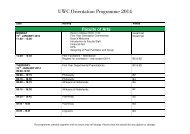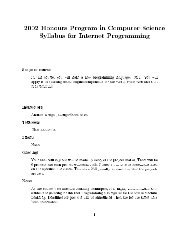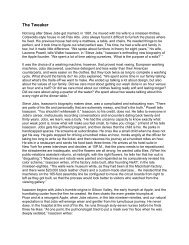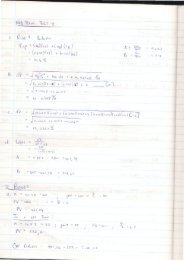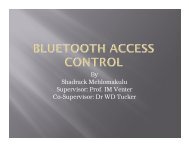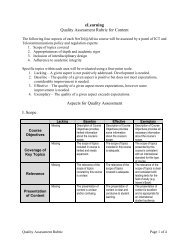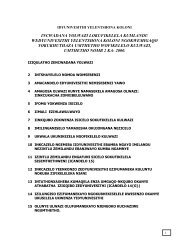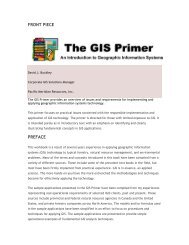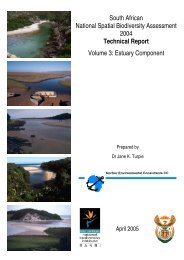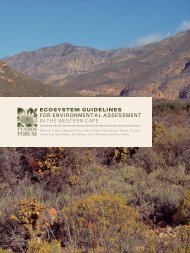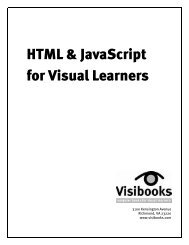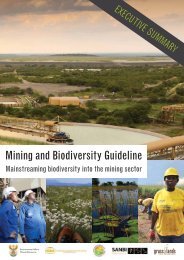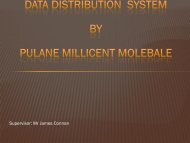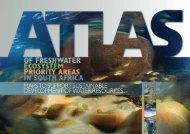uwc prospectus cover text 2012 web 22 June - University of the ...
uwc prospectus cover text 2012 web 22 June - University of the ...
uwc prospectus cover text 2012 web 22 June - University of the ...
You also want an ePaper? Increase the reach of your titles
YUMPU automatically turns print PDFs into web optimized ePapers that Google loves.
ifelong<br />
earning<br />
UNIVERSITY OF THE<br />
WESTERN CAPE<br />
STUDYING<br />
PART-TIME<br />
IN <strong>2012</strong><br />
a place <strong>of</strong> quality,<br />
a place to grow,<br />
from hope to action<br />
through knowledge
PROSPECTUS<br />
PART-TIME STUDY <strong>2012</strong><br />
13th Edition<br />
This <strong>prospectus</strong> has been produced<br />
by <strong>the</strong> Division for Lifelong Learning.<br />
While every effort has been made to<br />
ensure that <strong>the</strong> information herein is<br />
correct at <strong>the</strong> time <strong>of</strong> going to press,<br />
<strong>the</strong> university or its sub-contractors<br />
cannot be held liable for errors or<br />
consequences arising <strong>the</strong>refrom.<br />
Your comments and suggestions for<br />
improvements are welcome.<br />
Division For Lifelong Learning,<br />
Private Bag X17, Bellville 7535,<br />
<strong>University</strong> <strong>of</strong> <strong>the</strong> Western Cape.<br />
Director: Pr<strong>of</strong>essor Shirley Walters.<br />
Secretariat: Tel: 021 959-2799 Fax:<br />
021 959-3788 E-mail:<br />
lifelong@<strong>uwc</strong>.ac.za. Website:<br />
www.<strong>uwc</strong>.ac.za click on ‘lifelong<br />
learning’. Compiled by Jos Koetsier,<br />
Division for Lifelong Learning.<br />
Produced by Adprint.<br />
Li<br />
fe<br />
is<br />
a<br />
ar i<br />
e n<br />
L n<br />
g<br />
J !<br />
o y<br />
u ne<br />
r
Welcome to <strong>the</strong> <strong>University</strong> <strong>of</strong> <strong>the</strong> Western Cape<br />
It gives me great pleasure to welcome you to <strong>the</strong> <strong>University</strong> <strong>of</strong> <strong>the</strong> Western<br />
Cape. I sincerely hope that your time as a UWC student will have a positive<br />
influence on your life and on how you choose to engage with <strong>the</strong> world in<br />
which we live.<br />
As your university we have high expectations <strong>of</strong> you; as a nation we depend<br />
on you and your fellow graduates to influence, change and improve our<br />
society by critically engaging with issues. Your main purpose as a part-time<br />
Pr<strong>of</strong>essor Brian O' Connell<br />
Rector & Vice-Chancellor<br />
student here is not just to obtain a degree or certificate after three to five years <strong>of</strong> study, but to take<br />
responsibility to educate yourself in <strong>the</strong> full sense <strong>of</strong> that word. A degree or certificate is not just a<br />
piece <strong>of</strong> paper but also a powerful symbol embodying your efforts to acquire an education that is<br />
meaningful to you and to our society.<br />
UWC is committed to lifelong learning, both as a philosophy and a practice. This is in response to<br />
<strong>the</strong> fact that more and more people have <strong>the</strong> desire and <strong>the</strong> need to work while studying<br />
throughout <strong>the</strong>ir lives, not least because knowledge and skill become obsolete at an incredible<br />
rate. We understand that this is not an easy thing to accomplish and UWC is keen to support such<br />
students by striving to be flexible and relevant in <strong>the</strong> way in which we present our services.<br />
I trust that you will work hard and that your effort during <strong>the</strong> time spent at UWC will change your life<br />
for <strong>the</strong> better, opening new doors and opportunities in future. With your support, we will continue<br />
to make UWC a place <strong>of</strong> quality, a place to grow, from hope to action through knowledge.<br />
01
Contents<br />
Life is a Learning Journey 04<br />
Why should you choose UWC? 05<br />
Who we are 06<br />
How to use this <strong>prospectus</strong> 07<br />
Frequently asked questions about 'part-time studies' and 'After Hours Studies' 08<br />
What does UWC <strong>of</strong>fer? 13<br />
How do I gain access? 23<br />
UWC Point System 28<br />
When do part-time studies start? 32<br />
How much does it cost to study? 33<br />
What kind <strong>of</strong> support and facilities does UWC <strong>of</strong>fer to part-time students? 35<br />
How high achievers and role models are awarded: <strong>the</strong> Lifelong Learning Awards 41<br />
List <strong>of</strong> Continuing Education courses or short courses 44<br />
Courses <strong>of</strong> general interest (not accredited) 55<br />
List <strong>of</strong> qualifications <strong>of</strong>fered Part-time 69<br />
02
Anne Hope<br />
“I have become increasingly convinced that<br />
development is essentially a spiritual process.<br />
It does not depend primarily on having huge<br />
funds thrown at its feet, but on vision, daring,<br />
courage and generosity.”<br />
03
Life is a Learning Journey<br />
Recent surveys showed that 91% <strong>of</strong> our part-time students are working. Lifelong learning<br />
enables students to learn at different times in different ways, for different purposes at various<br />
stages <strong>of</strong> <strong>the</strong>ir lives and careers, and to gain full accreditation for <strong>the</strong>ir efforts. In this way, <strong>the</strong><br />
major pressures on time and money that full-time study traditionally requires are minimized in<br />
favour <strong>of</strong> shorter, smaller periods <strong>of</strong> study and payment. This is attractive to more and more<br />
students, making continuing and part-time study one <strong>of</strong> <strong>the</strong> fastest-growing sectors <strong>of</strong> student<br />
admissions to tertiary education institutions in South Africa, and world-wide.<br />
While we at <strong>the</strong> university will strive to give support to help, you require firm time management<br />
yourself to introduce a learning programme into <strong>the</strong> daily demands <strong>of</strong> work, family and friends.<br />
Strong family and workplace support, and a dedication to 'stay <strong>the</strong> course' are essential. The<br />
reward is certainly worth <strong>the</strong> effort, and <strong>the</strong> university is here to help you succeed.<br />
04
Why should you choose UWC?<br />
When you join UWC, you are joining a university with its roots deep in <strong>the</strong> communities it serves<br />
and a quality <strong>of</strong> learning that reaches <strong>the</strong> heights <strong>of</strong> international excellence. From business and<br />
economics, to education, public administration, health, natural sciences and much more, <strong>the</strong><br />
<strong>University</strong> <strong>of</strong> <strong>the</strong> Western Cape is a place where people come to join with o<strong>the</strong>rs to broaden<br />
knowledge, sharpen skills, and <strong>the</strong>n put back what <strong>the</strong>y have learnt to benefit <strong>the</strong>mselves, <strong>the</strong>ir<br />
careers, and <strong>the</strong> society in which we live.<br />
UWC is continually expanding <strong>the</strong> range <strong>of</strong> ways that students can access learning through <strong>the</strong><br />
university. In addition to part-time and continuing education programmes, more and more areas<br />
<strong>of</strong> study are being <strong>of</strong>fered on-line as e-learning courses.<br />
An additional option available in certain circumstances is customised and in-service training<br />
which is designed to suit <strong>the</strong> particular needs <strong>of</strong> employers and staff <strong>of</strong> organisations and<br />
businesses.<br />
05
Who we are<br />
The <strong>University</strong>'s 106ha main campus lies like an oasis in <strong>the</strong> centre <strong>of</strong> <strong>the</strong> Cape Metropolitan<br />
area. With a striking view <strong>of</strong> Table Mountain on one side and <strong>the</strong> dramatic Stellenbosch<br />
mountains on <strong>the</strong> o<strong>the</strong>r, it is just 27 kilometers from central Cape Town and <strong>the</strong> V & A Waterfront<br />
and a mere 7km from <strong>the</strong> airport. The 30ha Cape Flats Nature Reserve (a Provincial Heritage<br />
site) one <strong>of</strong> <strong>the</strong> last representative patches <strong>of</strong> Cape Flats fynbos, forms part <strong>of</strong> <strong>the</strong> modern, leafy<br />
campus. The <strong>University</strong> has two o<strong>the</strong>r campuses: one for Dentistry at Tygerberg Hospital<br />
complex close by, and an Oral Health Centre in <strong>the</strong> large township <strong>of</strong> Mitchell's Plain.<br />
UWC sees itself as an Engaged <strong>University</strong>, facing <strong>the</strong> future in a way that transcends <strong>the</strong> past,<br />
and embracing <strong>the</strong> complex reality <strong>of</strong> transformation and global technological advances. It is<br />
committed to excellence in teaching, learning and research, to nurturing <strong>the</strong> cultural diversity <strong>of</strong><br />
South Africa, and to responding in critical and creative ways to <strong>the</strong> needs <strong>of</strong> a society in<br />
transition. Drawing on its proud experience in <strong>the</strong> liberation struggle, <strong>the</strong> <strong>University</strong> is aware <strong>of</strong> a<br />
distinctive academic role in helping to build an equitable and dynamic society.<br />
06
How to use this <strong>prospectus</strong><br />
This <strong>prospectus</strong> is <strong>the</strong> university's thirteenth compilation in a handy format with information<br />
about part-time study, continuing education courses and some courses <strong>of</strong> general interest. It<br />
gives an overview <strong>of</strong> course options and is a quick reference to what is available for those who<br />
cannot or do not want to study full-time.<br />
The <strong>prospectus</strong> is divided into two sections: an introduction with general information, and<br />
course information which is divided into two sections:<br />
Continuing education course <strong>of</strong>ferings<br />
Accredited and non-accredited. Usually less than a year (pages 44 to 67) and some courses <strong>of</strong><br />
general interest <strong>of</strong>fered by <strong>the</strong> <strong>University</strong> Main Library and <strong>the</strong> UWC Centre for <strong>the</strong> Performing<br />
Arts (page 55).<br />
Part-time study<br />
These are accredited certificate, diploma and degree courses, (pages 69 to 79) <strong>of</strong> various<br />
durations.<br />
07
Frequently Asked Questions - Part-time studies and After Hours Studies<br />
When can I study part-time?<br />
Most courses accessible to Part-time students are usually <strong>of</strong>fered from Monday to Thursday<br />
after hours from 17h00 - 21h00. (Full-time students usually study from Monday to Friday from<br />
08h30 - 16h30). Some courses are also <strong>of</strong>fered during <strong>the</strong> weekend and as block courses<br />
during holidays.<br />
Are all UWC courses <strong>of</strong>fered after hours?<br />
No. All undergraduate pr<strong>of</strong>essional programmes (i.e. Nursing, Teaching, Social Work,<br />
Physio<strong>the</strong>rapy etc.) are only <strong>of</strong>fered full-time from 08h30 - 16h30. All undergraduate<br />
programmes in <strong>the</strong> Science and Dentistry faculties are only <strong>of</strong>fered full-time from 08h30 -<br />
16h30. For details consult <strong>the</strong> Faculty Calendars on <strong>the</strong> UWC <strong>web</strong>site www.<strong>uwc</strong>.ac.za (click on<br />
'download' on <strong>the</strong> UWC home page).<br />
If I want to study after-hours at UWC, what do I do?<br />
Establish that <strong>the</strong> course you want to follow is <strong>of</strong>fered after hours. For 'after hours' courses<br />
<strong>of</strong>fered, consult <strong>the</strong> 'continuing' and 'part-time' section <strong>of</strong> this <strong>prospectus</strong> from page 44 to 79.<br />
Should you need more information about courses or study programmes, please contact <strong>the</strong><br />
faculty <strong>of</strong>ficers listed in <strong>the</strong> Prospectus on pages 26 and 27.<br />
08
How long are <strong>the</strong> study programmes?<br />
UWC <strong>of</strong>fers a variety <strong>of</strong> qualifications including certificates, diplomas and degrees. Full-time<br />
certificates and diplomas are usually <strong>of</strong>fered over a one or two year period. Full-time degrees<br />
are <strong>of</strong>fered over a three or four year period. Students attending <strong>the</strong> after-hours classes usually<br />
take longer to complete <strong>the</strong>ir programmes. For example, a degree usually takes five to six<br />
years. Students decide on <strong>the</strong>ir course load based on <strong>the</strong>ir o<strong>the</strong>r commitments and in<br />
consultation with faculty staff.<br />
What does it cost to study after-hours as a part-time student?<br />
You will pay <strong>the</strong> same application fee as full-time student. The non-refundable application fee<br />
ranges from R50 to R150 and <strong>the</strong>re is an up front payment on registration (R3 900 in 2011). As a<br />
part-time student you only pay for <strong>the</strong> modules for which you have registered. For example, if<br />
you register for half <strong>of</strong> your first year modules you will pay half <strong>the</strong> annual fee (R8 650). For a list<br />
<strong>of</strong> fees (full-time) see page 33.<br />
Is financial aid available to part-time students?<br />
Yes. Enquire at <strong>the</strong> Student Financial Aid Office, foyer <strong>of</strong> <strong>the</strong> banking hall, ground floor,<br />
Administration Building. Or call <strong>the</strong> Financial Aid Help Desk: 021 959-3114.<br />
09
What does <strong>the</strong> term 'undergraduate' mean?<br />
The term 'undergraduate' refers to students who are studying for a first degree in a area <strong>of</strong> study.<br />
What does <strong>the</strong> term 'postgraduate' mean?<br />
The term 'postgraduate' refers to students who have completed <strong>the</strong>ir first degree and are<br />
studying towards a higher qualification such as an honours or master's degree.<br />
Are after hours admission requirements different from those <strong>of</strong> a full-time student?<br />
A Matriculation Exemption is <strong>the</strong> conventional admission requirement for all first degree studies.<br />
However, <strong>the</strong>re are alternative possibilities sanctioned by legislative authority. Subject to <strong>the</strong><br />
discretionary approval <strong>of</strong> Senate, <strong>the</strong> university may waive <strong>the</strong> requirement <strong>of</strong> full exemption<br />
and admit a student with a School Leaving Certificate, or a student without a School Leaving<br />
Certificate but with relevant prior learning.<br />
The conventional admission required for postgraduate qualifications is a completed<br />
undergraduate degree or equivalent qualification. In addition each faculty has <strong>the</strong>ir own entry<br />
requirements. For details per faculty consult page 16 to 21.<br />
10
How does Recognition <strong>of</strong> Prior Learning (RPL) provide university access to students<br />
without a Matric Certificate?<br />
The <strong>University</strong> Senate may consider granting access to students without a Senior Certificate,<br />
older than 23, but with relevant work experience or prior learning, if <strong>the</strong> Recognition <strong>of</strong> Prior<br />
Learning (RPL) application procedures have been followed. Students seeking access to <strong>the</strong><br />
university through RPL should apply to <strong>the</strong> RPL Office at <strong>the</strong> Division for Lifelong Learning: 021<br />
959-2799, lifelong@<strong>uwc</strong>.ac.za.<br />
Should I seek access through Recognition <strong>of</strong> Prior Learning (RPL) if I have a Senior<br />
Certificate but no Matriculation Exemption?<br />
Candidates with a Matric Certificate, who turn 23 before or during <strong>the</strong> first year <strong>of</strong> study, may<br />
qualify for age exemption under certain conditions as specified in <strong>the</strong> <strong>University</strong> Calendar.<br />
Please enquire at <strong>the</strong> Admissions Office.<br />
How does RPL relate to age exemption?<br />
Candidates who turn 45 before or during <strong>the</strong> first year <strong>of</strong> study may apply for full exemption and<br />
gain access without going through <strong>the</strong> formal RPL procedures. There is an administrative fee<br />
for candidates seeking access through <strong>the</strong>se routes.<br />
11
What about admission requirements for International Students?<br />
International students who have completed or are completing <strong>the</strong>ir secondary education by<br />
means <strong>of</strong> <strong>the</strong> O and A (Principal) level system must have a combination <strong>of</strong> both O and A level<br />
subjects in order to qualify for admission to an undergraduate degree programme. For more<br />
information contact <strong>the</strong> Student Administration Department, Henry Davids: 021 959-2198,<br />
hsdavids@<strong>uwc</strong>.ac.za.<br />
What facilities are available to students after hours?<br />
The following facilities and support services are available:<br />
Faculty Officers Help desks, The After Hours Services Help desk, Writing Centre, UWC<br />
Computer laboratories, <strong>University</strong> Library, Centre for Student Support Services, Financial Aid<br />
services; eg.National Student Financial Aid Scheme (NSFAS), Edu-loan, Campus Health,<br />
Security.<br />
On pages 35 to 40 you will find more detailed information about each service.<br />
12
What does UWC <strong>of</strong>fer?<br />
Qualification Structure<br />
UWC <strong>of</strong>fers over 200 qualifications. The general qualification structure for degrees at South<br />
African universities is a three-year Bachelor's Degree, followed by a one-year Honours Degree,<br />
a one or two-year Master's Degree (ei<strong>the</strong>r course work and mini-<strong>the</strong>sis, or <strong>the</strong>sis), and a Degree<br />
<strong>of</strong> Doctor awarded on a <strong>the</strong>sis. Pr<strong>of</strong>essional first degrees are four years or more in length and it<br />
is not uncommon to move directly from such a degree into a Master's programme.<br />
Postgraduate certificates and diplomas are also <strong>of</strong>fered in some areas. The table on page 15<br />
shows <strong>the</strong> various qualification levels.<br />
General Admissions Criteria for 2011 and beyond for first time undergraduate students<br />
The national Senior Certificate (for 2008 onwards) or matriculation with exemption (prior to<br />
2008) is <strong>the</strong> normal requirement for admission to <strong>the</strong> university. The minimum admission<br />
requirement is a National Senior Certificate (NSC) with an achievement rating <strong>of</strong> 4 (Adequate<br />
achievement, 50-59%) or better in 4 subjects chosen from <strong>the</strong> recognised 20-credit NSC<br />
subjects (known as <strong>the</strong> ‘designated subject list’). For those students who do not meet <strong>the</strong>se<br />
requirements <strong>the</strong>re are o<strong>the</strong>r options. See page 30 ‘Flexible access admission’.<br />
Not all undergraduate qualifications can be studied part-time. The undergraduate degree<br />
courses in <strong>the</strong> Community and Health Sciences faculty, Dentistry, Law and Sciences are only<br />
<strong>of</strong>fered during <strong>the</strong> day and <strong>the</strong> participants are pre-dominantly full-time registered students.<br />
13
Part-time students can make use <strong>of</strong> <strong>the</strong>se day time slots if <strong>the</strong>ir work commitment allows it.<br />
Some courses are <strong>of</strong>fered during weekends and in blocks during <strong>the</strong> holidays. Some are <strong>web</strong><br />
based and can be accessed from <strong>of</strong>f campus.<br />
Most postgraduate qualifications can be studied full-time and part-time.<br />
The schedules (page 16 to 21) show which qualifications are <strong>of</strong>fered during after hours.<br />
14
Undergraduate and postgraduate qualifications at UWC<br />
Level Qualifications Duration full-time<br />
Undergraduate Continuing Education courses Less than 1 year<br />
(Block periods)<br />
Less than 1 year<br />
Certificates<br />
Diplomas 1 - 2 years 2 - 3 years<br />
Degrees (eg. B.A. B.Sc) 3 - 4 years 4 - 5 years<br />
Postgraduate Continuing Education courses Less than 1 year Less than 1 year<br />
Certificates<br />
Diplomas 1 - 2 years 2 - 3 years<br />
Degrees Honours 1 - 2 years 2 - 3 years<br />
Masters<br />
PhD<br />
15<br />
1 year 2 years<br />
1 year 2 year<br />
Duration part-time<br />
2 - 3 years 3 - 4 years<br />
2 - 4 years 2 - 5 years
Programmes<br />
and courses<br />
Admission<br />
requirements<br />
Undergraduate degree, diploma & certificate courses - Part-time studies<br />
Faculty <strong>of</strong> Arts<br />
Undergraduate courses <strong>of</strong>fered during after hours<br />
BA<br />
Afrikaans<br />
Anthropology<br />
English (only <strong>the</strong> first year is <strong>of</strong>fered part-time)<br />
Sociology<br />
Theological studies<br />
BBIBL Library and Information Science (only <strong>the</strong> first year is <strong>of</strong>fered part-time)<br />
BTH: Theology<br />
Matric prior to 2008<br />
Matric exemption or alternative assessment.<br />
Programmes<br />
BA General, Bachelor <strong>of</strong> Library & Information Science, Bachelor <strong>of</strong> Theology:<br />
NSC Criteria (2008 onwards) UWC point system<br />
UWC Language requirements: English at level 4 (home or first additional language);<br />
Ano<strong>the</strong>r language at level 3 (home or first additional language).<br />
16
Career<br />
options<br />
Programmes<br />
BA General, Bachelor <strong>of</strong> Library & Information Science, Bachelor <strong>of</strong> Theology:<br />
Math or Math Literacy at level 3. One <strong>of</strong> <strong>the</strong> following at level 3: History, Geography,<br />
Religious Studies, Physical Science, Life Sciences, German, French, Latin. If you<br />
do not have any <strong>of</strong> <strong>the</strong> above recommended subjects, but qualify in terms <strong>of</strong> <strong>the</strong><br />
National Senior Certificate criteria endorsed for degree study, your application will<br />
still be considered.<br />
Teacher, Researcher, Administrator, Historian, Museum Officer, Heritage Sector<br />
Employee, Gender Equity Officer, Translator, Interpreter, Script Writer, Journalist,<br />
Publisher, Television or Radio Presenter, Communications Consultant, Marketer,<br />
Media Officer, Personnel Officer, Tourism Officer, Environmental Officer, Urban and<br />
Regional Planner, Diplomatic Officer, Employee <strong>of</strong> a NGO, Minister <strong>of</strong> Religion,<br />
Pastoral Counsellor, Librarian, Information Officer, Resource Developer &<br />
Community Worker<br />
For <strong>the</strong> list <strong>of</strong> postgraduate qualifications in <strong>the</strong> Arts faculty accessible through part-time study<br />
see pages 71 and 72.<br />
For <strong>the</strong> list <strong>of</strong> continuing education courses <strong>of</strong>fered by <strong>the</strong> Arts Faculty see pages 56 and 57.<br />
Dentistry<br />
No undergraduate courses are <strong>of</strong>fered during after hours.<br />
All undergraduate courses are <strong>of</strong>fered full-time.<br />
For <strong>the</strong> list <strong>of</strong> postgraduate qualifications in <strong>the</strong> Dentistry faculty accessible<br />
through part-time study see pages 74 and 75.<br />
17
All Undergraduate degree courses are only <strong>of</strong>fered full-time. For <strong>the</strong> list <strong>of</strong> postgraduate<br />
qualifications accessible through part-time study see pages 72 to 74.<br />
For <strong>the</strong> list <strong>of</strong> continuing education courses <strong>of</strong>fered by <strong>the</strong> CHS Faculty see pages 57 to 60.<br />
Programmes<br />
and courses<br />
Admission<br />
requirements<br />
BAdmin<br />
BCom (general)<br />
Undergraduate courses <strong>of</strong>fered during after hours.<br />
O<strong>the</strong>r specialized streams available after first year <strong>of</strong> enrolment are:<br />
BCom: Human Resources<br />
Management<br />
Finance<br />
Information Systems<br />
Economics Investments<br />
Public Management<br />
Matric prior to 2008<br />
Community & Health Sciences (CHS)<br />
Economic & Management Sciences (EMS)<br />
Programmes:<br />
BAdmin Matric exemption (50% aggregate)<br />
BCom (general) (50% aggregate)<br />
BCom (part-time) Matric exemption (50% aggregate)<br />
18
Career<br />
options<br />
NSC criteria (2008 onwards) UWC point system<br />
Language requirements: English level 4 (home or first additional language);<br />
Ano<strong>the</strong>r language at level 3 (home or first additional language).<br />
Programmes:<br />
BAdmin: Math level 3 or Math Literacy level 4.<br />
BCom (part-time): Math at level 4<br />
BCom General (3 year stream).<br />
Public Service Administrator, Bookkeeper, Auditor, Manager, Economist, Chartered<br />
Accountant, Financial Accountant, Broker, Fund Raiser, Personnel Manager,<br />
Industrial Psychologist, Trade Unionist, Marketing Manager, Purchasing/Production/<br />
Financial Manager, Financial Consultant.<br />
For <strong>the</strong> list <strong>of</strong> postgraduate qualifications in <strong>the</strong> EMS faculty accessible<br />
through part-time study see pages 75 and 76.<br />
For <strong>the</strong> list <strong>of</strong> continuing education courses <strong>of</strong>fered by <strong>the</strong> EMS Faculty see pages 60 to 64.<br />
19
Programmes<br />
and courses<br />
Admission<br />
requirements<br />
Career<br />
options<br />
Education<br />
Undergraduate courses <strong>of</strong>fered during after hours.<br />
Qualifications <strong>of</strong> <strong>the</strong> Centre for Adult and Continuing Education (CACE)<br />
Higher Certificate in Education, Training and Development: Adult Learning.<br />
Higher Diploma in Education, Training and Development: Workplace Learning.<br />
Matric prior to 2008<br />
Matric exemption<br />
Conditional / no exemption - Admission tests / interview.<br />
Certain additional requirements must be met for students who obtained a Senior<br />
Certificate (SC) before 1997.<br />
NSC criteria (2008 onwards) UWC point system<br />
Language requirements: English level 4 (home or first additional language);<br />
Ano<strong>the</strong>r language at level 3 (home or first additional language).<br />
Programmes:<br />
Certificate and Diploma in Adult Education: No specific subject requirements o<strong>the</strong>r<br />
than <strong>the</strong> relevant NSC for certificate or diploma studies (as well as 23 points in <strong>the</strong><br />
case <strong>of</strong> diploma studies).<br />
Adult Educator, Lecturer, Community Worker / Educator, Training Coordinator,<br />
Educational Researcher.<br />
For <strong>the</strong> list <strong>of</strong> postgraduate qualifications in <strong>the</strong> Education faculty<br />
.<br />
20
Programmes<br />
and courses<br />
Admission<br />
requirements<br />
Career<br />
options<br />
accessible through part-time study see pages 76 and 77.<br />
For <strong>the</strong> list <strong>of</strong> continuing education courses <strong>of</strong>fered by <strong>the</strong> Education Faculty<br />
see pages 64 to 66 and for <strong>the</strong> Division for Lifelong Learning see page 66.<br />
Law<br />
Undergraduate courses <strong>of</strong>fered during after hours.<br />
Certificate in Forensic Examination<br />
Senior Certificate plus three years working experience.<br />
Internal, external and forensic auditors, public prosecutors, bank <strong>of</strong>ficials, o<strong>the</strong>r<br />
managers with financial responsibility.<br />
For <strong>the</strong> list <strong>of</strong> postgraduate qualifications in <strong>the</strong> Law faculty<br />
accessible through part-time study see <strong>the</strong> pages 77 and 78.<br />
Natural Sciences<br />
All undergraduate courses are only <strong>of</strong>fered full-time.<br />
For <strong>the</strong> list <strong>of</strong> postgraduate qualifications in <strong>the</strong> Natural Sciences faculty<br />
accessible through part-time study see pages 78 and 79.<br />
For <strong>the</strong> list on continuing education courses <strong>of</strong>fered by <strong>the</strong> Natural Sciences faculty see page 67.<br />
21
Julius Nyerere<br />
(19<strong>22</strong> - 1999)<br />
“The purpose <strong>of</strong> education is liberation <strong>of</strong> people from <strong>the</strong><br />
restraints and limitations <strong>of</strong> ignorance and dependency.<br />
Education has to increase people’s physical and mental<br />
freedom – to increase <strong>the</strong>ir control over <strong>the</strong>mselves, <strong>the</strong>ir<br />
own lives and <strong>the</strong> environment in which <strong>the</strong>y live.”<br />
<strong>22</strong>
How do I gain access?<br />
The following questions will guide you through <strong>the</strong> application and registration process.<br />
How to choose my course?<br />
Consult <strong>the</strong> electronic <strong>prospectus</strong>es on <strong>the</strong> UWC <strong>web</strong>site (click on Downloads on top tool bar<br />
home page www.<strong>uwc</strong>.ac.za). Consult info for prospective students on <strong>the</strong> university home<br />
page. Study this Prospectus (Study Part-time in <strong>2012</strong>).<br />
How do I get more detailed information about part-time studies and continuing<br />
education courses?<br />
Contact <strong>the</strong> faculties and departments directly for more information about entry requirements,<br />
subject choice, course content, course duration, costs, and financial aid (see pages 26 and 27).<br />
Contact <strong>the</strong> Division for Lifelong Learning if you need more information about Recognition <strong>of</strong><br />
Prior Learning (RPL): 021 959-2799.<br />
How do I apply when I want to start with my part-time studies in <strong>2012</strong>?<br />
The preferred application is on-line www.<strong>uwc</strong>.ac.za, open 24 hours a day.<br />
If you don't meet <strong>the</strong> entry requirements contact <strong>the</strong> Faculties or Departments to find out<br />
whe<strong>the</strong>r you qualify for access through: Age exemption, Senate Discretionary access (SD), and<br />
23
for Recognition <strong>of</strong> Prior Learning. See details on pages 30 and 31.<br />
Which are <strong>the</strong> deadlines for application and what application fees must I pay?<br />
The deadlines for applications and amounts payable for non-refundable application fees are:<br />
1st Closing Date: 31 August 2011 - R50<br />
2nd Closing Date: 30 September 2011 - R100<br />
Late Applications: 01 October 2011 - R150<br />
What do I need to complete my application?<br />
Your ID or passport number; Your matric results or results <strong>of</strong> an equivalent qualification: if you<br />
don't have an exemption you have to tick <strong>of</strong>f <strong>the</strong> box Senate Discretionary admission;<br />
Candidates who don't have a matric or equivalent qualification must tick <strong>of</strong>f <strong>the</strong> 'RPL' box.<br />
How can I check my application status?<br />
You may call <strong>the</strong> Call Centre to enquire about <strong>the</strong> status <strong>of</strong> your application at +27 21 959-3900<br />
or +27 21 959-3901. Keep your application number at hand when you call.<br />
24
How will I know whe<strong>the</strong>r my application is successful?<br />
You will get an <strong>of</strong>ficial acceptance letter by <strong>the</strong> <strong>University</strong>, issued by <strong>the</strong> Department <strong>of</strong> Student<br />
Administration, which informs you whe<strong>the</strong>r your application was successful.<br />
When can I register?<br />
You can only register after you receive <strong>the</strong> <strong>of</strong>ficial university acceptance letter. Registration<br />
starts in <strong>the</strong> second week <strong>of</strong> January <strong>2012</strong>.<br />
What must I bring along to successfully complete my registration?<br />
The <strong>of</strong>ficial university acceptance letter;<br />
A certified copy <strong>of</strong> your Senior Certificate or <strong>the</strong> Official Advice/Statement <strong>of</strong> Results issued by<br />
your Provincial Education authority (not for RPL candidates);<br />
Your Identity Document (or certified copy);<br />
The registration fee and <strong>the</strong> first instalment <strong>of</strong> your fees: you are required to pay R3 900 (2011<br />
fees). If you have already paid your fees into <strong>the</strong> UWC’s bank account, bring pro<strong>of</strong> <strong>of</strong> payment.<br />
25
Faculty / Department<br />
Community &<br />
Health Sciences<br />
Dentistry<br />
Department <strong>of</strong> Student Administration / Faculties<br />
Name / Email<br />
Arts Collette Schroeder<br />
cschroeder@<strong>uwc</strong>.ac.za<br />
Micheline Lemboe<br />
mlemboe@<strong>uwc</strong>.ac.za<br />
Belinda Petersen<br />
bpetersen@<strong>uwc</strong>.ac.za<br />
Sandra Waterboer<br />
swaterboer@<strong>uwc</strong>.ac.za<br />
Education Suheimah Towfie<br />
stowfie@<strong>uwc</strong>.ac.za<br />
Economic & Management<br />
Sciences<br />
Caroline Hoorn<br />
choorn@<strong>uwc</strong>.ac.za<br />
Law Elizabeth Witten<br />
ewitten@<strong>uwc</strong>.ac.za<br />
Certificate <strong>of</strong><br />
Forensic Examination<br />
Denise Snyders<br />
dsnyders@<strong>uwc</strong>.ac.za<br />
postgraduate studies<br />
26<br />
Fax<br />
021 959-2376<br />
021 959-2376<br />
021 959-2755<br />
021 931-<strong>22</strong>87<br />
Telephone<br />
021 959-2407<br />
021 959-9247<br />
021 959-2744<br />
021 937-3004<br />
021 959-2647 021 959-<strong>22</strong>76<br />
021 959-1369 021 959-3619<br />
021 959-3486<br />
021 959-3486<br />
021 959-2960<br />
021 959-3292
Faculty / Department<br />
Natural Science<br />
Department <strong>of</strong><br />
Student Administration<br />
Financial Aid<br />
Department <strong>of</strong> Student Administration / Faculties<br />
Name / Email<br />
Sharon Slinger<br />
sslinger@<strong>uwc</strong>.ac.za<br />
servicedesk@<strong>uwc</strong>.ac.za<br />
Helpdesk<br />
27<br />
Fax<br />
021 959-<strong>22</strong>66<br />
Telephone<br />
021 959-3891<br />
021 959-3668 021 959-3348<br />
021 959-2897<br />
021 959-3394<br />
021 959-3114<br />
021 959-2737
UWC Points System<br />
For admission to degree and diploma programmes UWC uses a weighted system for<br />
calculating points. In order to be admitted to degree studies <strong>the</strong> candidate should have attained<br />
a minimum <strong>of</strong> 27 points, and to diploma studies, a minimum <strong>of</strong> 23 points, on <strong>the</strong>ir national senior<br />
certificates.<br />
In addition to <strong>the</strong> general criteria for admission to <strong>the</strong> <strong>University</strong>, additional criteria must be met<br />
to qualify for admission to particular study programmes. Specific admission criteria for faculties<br />
and programmes can be found in <strong>the</strong> schedules on pages 16 to 21, and in <strong>the</strong> faculty calendars.<br />
28
Level<br />
8<br />
7<br />
6<br />
5<br />
4<br />
3<br />
2<br />
1<br />
NSC Levels UWC Points<br />
Percentage<br />
90-100%<br />
80-90%<br />
70-79%<br />
60-69%<br />
50-59%<br />
40-49%<br />
30-39%<br />
20-29%<br />
less than 20%<br />
Points for English*<br />
15<br />
13<br />
11<br />
9<br />
7<br />
5<br />
3<br />
1<br />
0<br />
Points for Math or<br />
Math Literacy<br />
15<br />
13<br />
11<br />
9<br />
7<br />
5<br />
3<br />
1<br />
0<br />
Points for Life<br />
Orientation<br />
3<br />
3<br />
2<br />
2<br />
2<br />
1<br />
1<br />
1<br />
0<br />
Points for Each<br />
o<strong>the</strong>r subject<br />
* 'English' refers to ei<strong>the</strong>r English home language or English first additional language, not second additional language.<br />
29<br />
8<br />
7<br />
6<br />
5<br />
4<br />
3<br />
2<br />
1<br />
0
Flexible Access Admission<br />
A flexible admissions system and equitable selection procedures ensure that students from all<br />
sectors <strong>of</strong> <strong>the</strong> community have a fair chance to gain access to university studies. The following<br />
options are available:<br />
Senate Discretionary (SD) Admission<br />
A National Senior Certificate (2008) or matriculation with exemption is <strong>the</strong> normal requirement<br />
for admission to <strong>the</strong> university. You may, however, have a matric without exemption and be<br />
willing to undergo assessment specified by <strong>the</strong> university to determine your potential to<br />
succeed. Subject to <strong>the</strong> discretionary approval <strong>of</strong> Senate <strong>the</strong> university can admit students<br />
conditionally, based on <strong>the</strong> results <strong>of</strong> <strong>the</strong> assessment mentioned before. Good symbols in<br />
certain matric subjects may also be a requirement for admission into particular programmes.<br />
For more information, contact <strong>the</strong> faculty <strong>of</strong> your choice.<br />
Age Exemption Admission<br />
Learners who have a National Senior Certificate and who will be 23 years or older during <strong>the</strong>ir<br />
first year <strong>of</strong> study may qualify for admission to university provided <strong>the</strong>y adhere to certain<br />
conditions. Consult <strong>the</strong> Admissions Office for more details. Learners over 45 years <strong>of</strong> age can<br />
be admitted to <strong>the</strong> university without any formal entry requirements but we would strongly<br />
advise <strong>the</strong> Portfolio Development Course for most applicants. Contact <strong>the</strong> Division for Lifelong<br />
Learning: 021 959-2799 for advice in this regard.<br />
30
Recognition <strong>of</strong> Prior Learning (RPL)<br />
Learners who are 23 years <strong>of</strong> age or older and who do not have formal qualifications to enter<br />
university can now bid for admission ei<strong>the</strong>r by writing tests <strong>of</strong> academic readiness or by doing a<br />
portfolio development course. The tests for academic readiness are written in October whilst<br />
<strong>the</strong> Portfolio Course is <strong>of</strong>fered on a part-time basis over nine weeks and involves attending five<br />
contact sessions and two advising sessions as candidates prepare <strong>the</strong>ir learning portfolio. The<br />
successful portfolio presents evidence that <strong>the</strong> student has attained <strong>the</strong> level required for entry,<br />
although in some cases, an additional entrance test may be prescribed. The portfolio<br />
development course will be <strong>of</strong>fered in May/<strong>June</strong> and August / September. For fur<strong>the</strong>r<br />
information contact <strong>the</strong> Division for Lifelong Learning: 021 959-2799 or visit our <strong>web</strong>site:<br />
www.<strong>uwc</strong>.ac.za (click on 'Division for Lifelong Learning', 'Access' and 'RPL').<br />
Continuing Education Courses (CE)<br />
In addition to <strong>the</strong> formal menu <strong>of</strong> part-time studies at UWC <strong>the</strong>re are various o<strong>the</strong>r 'short'<br />
courses on <strong>of</strong>fer to individuals, pr<strong>of</strong>essionals, corporate and community-based organizations.<br />
These courses which are referred to as CE Courses in this <strong>prospectus</strong> (page 44 to 67), are<br />
aimed at meeting <strong>the</strong> needs <strong>of</strong> those who are currently employed or unemployed, helping to<br />
secure access to <strong>the</strong> kinds <strong>of</strong> knowledge, skills and information required to participate<br />
effectively in society and in <strong>the</strong> changing economy.<br />
31
When do part-time studies start?<br />
Lectures will start on Monday 30 January <strong>2012</strong>. Some programmes (e.g. programmes <strong>of</strong>fered<br />
by <strong>the</strong> School <strong>of</strong> Business and Finance) may start a week earlier.<br />
Li<br />
fe<br />
is<br />
a<br />
ar i<br />
e n<br />
L n<br />
32<br />
g<br />
J!<br />
o y<br />
u ne<br />
r
How much does it cost to study?<br />
All course fees listed in this <strong>prospectus</strong> are as <strong>the</strong>y were for <strong>the</strong> 2011 academic year, unless<br />
o<strong>the</strong>rwise stated. For <strong>the</strong> fees for <strong>2012</strong> consult <strong>the</strong> fee booklet <strong>of</strong> <strong>the</strong> university, available<br />
towards <strong>the</strong> end <strong>of</strong> <strong>the</strong> year at <strong>the</strong> student accounts department: 021 959-3108 / 3109.<br />
Alternatively click on ‘prospective students’ on <strong>the</strong> home page www.<strong>uwc</strong>.ac.za and ‘student<br />
fees’.<br />
Summary <strong>of</strong> Tuition Fees for 2011 (South African Students)<br />
The following fees listed are full-time fees. On average part-time students pay 75% <strong>of</strong> <strong>the</strong> fulltime<br />
fee. Your fee is costed per module.<br />
Undergraduate, levied per year level<br />
B Com (Gen) & (Acc), B Admin, etc - R17 300 p.a.<br />
Arts: e.g. BA, B Bibl - R17 300 p.a.<br />
Certificate for Forensic Examination - R7 800<br />
(excluding application fee (R50-R100) and registration fee - R830).<br />
Postgraduate fees<br />
Honours - R17 290 full course<br />
Masters - R19 240 full course<br />
PhD - R19 240 full course<br />
33
Pregs Govender<br />
“In <strong>the</strong> silence I meditated on <strong>the</strong> power <strong>of</strong> love<br />
within ourselves. With such power we can evoke our<br />
original qualities <strong>of</strong> peace and joy and recognise that<br />
<strong>the</strong>se qualities are intrinsic to every one <strong>of</strong> us; with<br />
such power we can help transform our world.”<br />
34
What kind <strong>of</strong> support and facilities do UWC <strong>of</strong>fer to part-time students?<br />
The faculty <strong>of</strong>ficers are your first port <strong>of</strong> call. You can contact <strong>the</strong>m for more detailed information<br />
about <strong>the</strong> course <strong>of</strong> your choice. The following services and support facilities are available to<br />
part-time students.<br />
After Hours Services help desk<br />
This help desk operates during each term lecture periods and is part <strong>of</strong> <strong>the</strong> ‘After Hours<br />
Study Zone'. This zone in <strong>the</strong> central area <strong>of</strong> <strong>the</strong> university aims to create a sociable,<br />
safe and service oriented environment for adult learners who study during after<br />
hours. Find <strong>the</strong> After Hours Services Help desk in B-Block, first floor, opposite<br />
Lecture Hall B3. The Help desk is open Monday to Thursday from 16h30 to 20h30.<br />
For more information contact <strong>the</strong> Division for Lifelong Learning: 021 959-2799, or<br />
lifelong@<strong>uwc</strong>.ac.za. Watch <strong>the</strong> notice boards branded with <strong>the</strong> 'After Hours Study Zone' logo for<br />
up-to-date information.<br />
Student Administration<br />
Contact Student Administration: 021 959-3348, 021 959-2895 or 021 959-3394.<br />
(International: +27 21 959-3348, +27 21 959-2895 or +27 21 959-3394).<br />
35
Writing Centre<br />
The Writing Centre is an academic literacy support department that assists students in<br />
developing and refining <strong>the</strong>ir academic writing skills. Writing Centre consultants are specially<br />
trained to provide assistance to undergraduate students with <strong>the</strong> demands <strong>of</strong> academic writing.<br />
Contact: 021 959-2390. Consultations 021 959-3919 (Lab).<br />
UWC Computer laboratories<br />
Currently UWC has approximately 68 computing laboratories totaling over 2 000 computers<br />
(training as well as walk-in facilities) on and <strong>of</strong>f campus. This includes smaller laboratories in<br />
some Departments, as well as larger ones located in central campus, such as <strong>the</strong> Thintana<br />
Computer Lab. The majority <strong>of</strong> <strong>the</strong>se laboratories operate with Windows based programmes,<br />
however Open Source programmes are being incorporated.<br />
<strong>University</strong> Library<br />
The Library supports and enriches <strong>the</strong> <strong>University</strong>'s mission and its commitment to learning,<br />
teaching, research and community outreach by providing students with both <strong>the</strong> space and<br />
environment in which students can explore and acquire knowledge and develop lifelong<br />
learning and information seeking skills. Students have access to a vast array <strong>of</strong> information<br />
36
esources in a number <strong>of</strong> different formats. Contact <strong>the</strong> help-desk (open during library hours):<br />
021 959-2932, KCLLibrary@<strong>uwc</strong>.ac.za .<br />
Library Hours<br />
Monday to Thursday: 08h20 - 24h00<br />
Friday: 08h20 - 20h30<br />
Saturday: 09h00 - 17h00<br />
Student Enrolment Management Unit (SEMU)<br />
SEMU <strong>of</strong>fers free career guidance using <strong>the</strong> PACE self exploratory computer based<br />
questionnaire. The completion <strong>of</strong> <strong>the</strong> questionnaire is followed by a counselling session with a<br />
skilled career counsellor. Contact: 021 959-2405, zmdwara@<strong>uwc</strong>.ac.za for more information.<br />
Centre for Student Support Services<br />
This Centre provides high Support Services quality, free and confidential services in <strong>the</strong> area<br />
Student Development, Student Academic Support, Psychological Services, Students with<br />
Disabilities and Leadership and Social Responsibilities. It <strong>of</strong>fers broad student-centered<br />
development and pr<strong>of</strong>essional services, programmes, training opportunities and resources<br />
aimed at enhancing <strong>the</strong> quality <strong>of</strong> life and wellness <strong>of</strong> <strong>the</strong> campus community. The focus is to<br />
37
engage students' potential in order to assist in developing responsible and responsive citizens<br />
for tomorrow at UWC. The vision is to develop a safe, secure and supportive campus<br />
environment which enhances student learning on multiple levels. We conduct research and<br />
engage with national issues and debates to provide a cutting edge service which meets<br />
students' development needs. We are staffed by dynamic pr<strong>of</strong>essionals who are registered with<br />
national bodies and provide. Contact <strong>the</strong> Centre for Student Support Services: 021 959-<strong>22</strong>99.<br />
Director: Birgit Schreiber: 021 959-<strong>22</strong>99, bschreiber@<strong>uwc</strong>.ac.za.<br />
Division for Postgraduate Studies incorporating <strong>the</strong> PET Project<br />
Support Systems for Postgraduate Students. The Division for Postgraduate Studies (DPS)<br />
[incorporating <strong>the</strong> Postgraduate Enrolment and Throughput (PET) project] was launched in<br />
April 2009. Under <strong>the</strong> PET Project component, various study guides have been published and<br />
disseminated. The project has assisted <strong>the</strong> institution to create a framework in which students<br />
can find support, which attends to common difficulties such as isolation and inadequate<br />
advising, and promotes academic collaboration and mentorship. The aim <strong>of</strong> <strong>the</strong> PET Project is<br />
to help postgraduate students complete <strong>the</strong>ir <strong>the</strong>ses and to decrease time-to-degree. Contact<br />
Dr. Lorna Holtman: 021 959-2451, lholtman@<strong>uwc</strong>.ac.za or <strong>the</strong> Administrator: 021 959-3920,<br />
petbookings@<strong>uwc</strong>.ac.za.<br />
38
Financial Aid Assistance<br />
Financial assistance is available to all registered students at UWC in <strong>the</strong> form <strong>of</strong> NSFAS funding<br />
and various bursaries. Application forms can be obtained from <strong>the</strong> Financial Aid Office once a<br />
student number has been released by Student Administration, in <strong>the</strong> final acceptance letter.<br />
Application for financial aid is strictly governed by due dates. Students need to familiarize<br />
<strong>the</strong>mselves with <strong>the</strong>se due dates to avoid disappointment. Students will be informed once <strong>the</strong><br />
application is assessed and criteria <strong>of</strong> NSFAS funding or bursaries are met. Notification <strong>of</strong><br />
bursaries will be sent to <strong>the</strong> student university e-mail account. Watch for notices from ‘UWC<br />
Communications’. The onus is on <strong>the</strong> student to apply for available funding. For more<br />
information contact N Manqane on 021 959-9707or nmanqane@<strong>uwc</strong>.ac.za or visit <strong>the</strong><br />
Financial Aid <strong>of</strong>fice in <strong>the</strong> prefabs behind <strong>the</strong> Central Administration Building.<br />
Edu-Loan<br />
To avoid high up-front payments Edu-loan provides loans, to be paid back in ten equal<br />
installments during <strong>the</strong> year. For more information contact Edu-loan: 021 959-3104, Fax 021<br />
959-3749, eduloan@<strong>uwc</strong>.ac.za, or visit www.eduloan.co.za.<br />
39
Campus Health<br />
The Centre is open throughout <strong>the</strong> year (closed during December holidays - two weeks). The<br />
Centre also <strong>of</strong>fers a confidential HIV/Aids testing facility. Contact: 021 959-2876.<br />
Security<br />
Security patrols on campus day and night help keep people and possessions safe. Contact: 021<br />
959-2564.<br />
Student Representative Council (SRC)<br />
For advice, queries, complaints and support from students elected to represent student<br />
interests. Contact: 021 959-2802.<br />
The eLearning Development & Support Unit (EDSU)<br />
The eLearning support team has a responsibility toward building <strong>the</strong> capacity <strong>of</strong> <strong>the</strong> lecturers<br />
and students <strong>of</strong> UWC to engage and interact with online communication and assessment tools<br />
such as: Discussion forums, Chat rooms, Online Assignments, Blogs, Wikis, Podcasting (audiorecordings).<br />
Contact EDSU if you would like to start your eLearning journey:<br />
elearning@<strong>uwc</strong>.ac.za, 021 959-3200/3068. Peruse <strong>the</strong> university <strong>web</strong>site if you want to read<br />
more about <strong>the</strong> integrated eLearning support team at www.<strong>uwc</strong>.ac.za and click on 'eLearning'.<br />
40
The Division for Lifelong Learning (DLL)<br />
DLL was established in 1999 to assist with <strong>the</strong> ongoing development <strong>of</strong> more flexible,<br />
convenient and socially relevant learning options, and to improve <strong>the</strong> facilities for part-time<br />
students at undergraduate and postgraduate level.<br />
For more information contact DLL: 021 959-2799, lifelong@<strong>uwc</strong>.ac.za, <strong>web</strong>site:<br />
www.<strong>uwc</strong>.ac.za, click on 'Lifelong Learning'.<br />
Lifelong Learning Awards<br />
High achievers and role models are awarded <strong>the</strong> Lifelong Learning Awards. These awards are<br />
given annually for inspiring achievements. Calls for nominations are advertised on <strong>the</strong> campus,<br />
on <strong>the</strong> <strong>web</strong>site and through e-mails. A selection <strong>of</strong> three members <strong>of</strong> <strong>the</strong> Senate lifelong<br />
Learning Committee (SLLC) short lists <strong>the</strong> candidates.<br />
They make recommendations to <strong>the</strong> Rector, who makes <strong>the</strong> final decision. The Lifelong<br />
Learning Awards are <strong>the</strong>n presented by <strong>the</strong> Vice Chancellor during <strong>the</strong> Graduation Ceremony.<br />
The Division for Lifelong Learning (DLL) acts as <strong>the</strong> secretariat for <strong>the</strong> awards.<br />
Lifelong Learners Award (Part-time Study): celebrating <strong>the</strong> achievements <strong>of</strong> part-time learners;<br />
Lifelong learning Award (Alternative Access): for students who have entered <strong>the</strong> university via<br />
alternative access;<br />
41
Senior Lifelong Learning Award: celebrates <strong>the</strong> achievement <strong>of</strong> learners older than 50 years;<br />
Lifelong Learning Group Award: celebrates a significant contribution that a department, unit or<br />
association on campus has made to <strong>the</strong> development <strong>of</strong> UWC's Lifelong Learning Mission.<br />
For more information contact <strong>the</strong> Division for Lifelong Learning: 021 959-2799,<br />
lifelong@<strong>uwc</strong>.ac.za. Visit our <strong>web</strong>site for 'face to face' information about <strong>the</strong> most recent award<br />
winners. Go to www.<strong>uwc</strong>.ac.za, click on 'Lifelong Learning' and on 'Lifelong Learning Awards'.<br />
42
How do I get to <strong>the</strong> <strong>University</strong>?<br />
The university is easily accessible by road (taxis, buses) and rail (Unibell railway station). A map<br />
showing pedestrian and vehicle entrances is located on <strong>the</strong> inside back <strong>cover</strong> <strong>of</strong> <strong>the</strong> <strong>prospectus</strong>.<br />
When using private transport access <strong>the</strong> university through <strong>the</strong> Modderdam road main entrance<br />
or Symphony Road entrance opposite <strong>the</strong> Cape Peninsula <strong>University</strong> <strong>of</strong> Technology. Only use<br />
<strong>the</strong> designated parking areas to avoid congestion and traffic fines (wheel clamps). The<br />
university is seven kilometers away from Cape Town International Airport.<br />
Additional to <strong>the</strong> formal menu <strong>of</strong> part-time programmes on <strong>of</strong>fer at UWC <strong>the</strong>re are various 'short'<br />
courses on <strong>of</strong>fer to individuals, pr<strong>of</strong>essionals, community-based organisations, corporate and<br />
government sectors. These courses are referred to as Continuing Education (CE) courses and<br />
are aimed at meeting <strong>the</strong> needs <strong>of</strong> those who are currently employed or unemployed, helping to<br />
secure access to <strong>the</strong> kinds <strong>of</strong> knowledge, skills and information required to participate<br />
effectively in society and in <strong>the</strong> changing economy.<br />
43
Continuing Education: General Information<br />
In addition to <strong>the</strong> formal menu <strong>of</strong> part-time programmes on <strong>of</strong>fer at UWC <strong>the</strong>re are various 'short'<br />
courses on <strong>of</strong>fer to individuals, pr<strong>of</strong>essionals, community-based organisations, corporate and<br />
government sectors. These courses are referred to as Continuing Education (CE) courses and<br />
are aimed at meeting <strong>the</strong> needs <strong>of</strong> those who are currently employed or unemployed, helping to<br />
secure access to <strong>the</strong> kinds <strong>of</strong> knowledge, skills and information required to participate<br />
effectively in society and in <strong>the</strong> changing economy.<br />
CE Courses are available to members <strong>of</strong> staff and <strong>the</strong> public at various times and venues during<br />
<strong>the</strong> year. Some courses are credit-bearing against existing qualifications, o<strong>the</strong>rs are non creditbearing,<br />
although <strong>the</strong>y may carry 'Continuing Pr<strong>of</strong>essional Development (CPD) points' if<br />
accredited by a pr<strong>of</strong>essional association. The <strong>University</strong> is open to partnerships with <strong>the</strong> public<br />
and private sector with <strong>the</strong> aim <strong>of</strong> creating customised learning programmes that benefit<br />
organizations and individuals, while enhancing motivation and productivity in <strong>the</strong> workplace<br />
and in communities.<br />
In 2003 <strong>the</strong> <strong>University</strong> approved a policy to create a register <strong>of</strong> CE courses which are eight hours<br />
or longer. The Policy for Quality Assurance was approved in 2006 to ensure quality procedures<br />
and practices relating to all CE courses <strong>of</strong>fered at UWC.<br />
44
The majority <strong>of</strong> CE Courses at UWC are <strong>of</strong>fered by <strong>the</strong> following schools and departments:<br />
The School <strong>of</strong> Public Health and School <strong>of</strong> Nursing has a wide range <strong>of</strong> CPD courses for<br />
pr<strong>of</strong>essionals in <strong>the</strong> healthcare sector. The School <strong>of</strong> Government <strong>of</strong>fers a range <strong>of</strong> executive,<br />
middle management and secretarial courses for employees in local, provincial and national<br />
government including <strong>the</strong> parliamentary staff. The School <strong>of</strong> Business and Finance <strong>of</strong>fers a<br />
wide selection <strong>of</strong> business related courses. The Human Resources Department coordinates<br />
CE courses for staff at UWC.<br />
O<strong>the</strong>r departments and units <strong>of</strong>fering CE courses include:<br />
Economics<br />
Division for Lifelong Learning<br />
Fair Share<br />
Fur<strong>the</strong>r Education and Training Institute<br />
HIV/AIDS Programme<br />
Industrial Psychology<br />
Interdisciplinary Centre <strong>of</strong> Excellence for Sports Science and Development (ICESSD)<br />
Religion and Theology<br />
Science Learning Centre for Africa<br />
Statistics<br />
Xhosa<br />
45
A - Z Continuing Education (CE) courses<br />
In this <strong>prospectus</strong> we only listed <strong>the</strong> course titles and contact details <strong>of</strong> providers. More<br />
elaborate course descriptors are on <strong>the</strong> university <strong>web</strong>site www.<strong>uwc</strong>.ac.za. Click on 'lifelong<br />
learning', 'continuing education' and browse}.<br />
Please note course dates are subject to demand. Please contact <strong>the</strong> departments for course<br />
information. The contact details are indicated below.<br />
A<br />
Accessing <strong>the</strong> Language <strong>of</strong> Learning and Teaching using <strong>the</strong> SIOP model<br />
(Sheltered Instruction Observation Protocol) 64<br />
Advanced Committee Management 63<br />
Advanced Management Development Programme for Local Government 63<br />
Advanced participatory techniques in facilitation, evaluation and action-research 60<br />
Advanced sport and recreation for community development 60<br />
Advanced sport, physical activity and recreation in psychosocial and health intervention 60<br />
AIDS and Education Level 1 66<br />
AIDS and Education Level 2 66<br />
AIDS and Education Level 3 66<br />
AIDS and Education Level 4 66<br />
AIDS in <strong>the</strong> African Con<strong>text</strong> 66<br />
Alcohol Problems: Developing multi-faceted programmes for communities 57<br />
Art and Heart <strong>of</strong> <strong>the</strong> Educator / Trainer 66<br />
46
B<br />
Building AIDS-competent Schools 66<br />
Building Responses to AIDS in Schools and Communities 66<br />
Business Communication 62<br />
Business Law for Small Middle Enterprises (SMEs) 62<br />
C<br />
Christian Ministry 111 56<br />
Christian Ministry 121 56<br />
Classroom Management in FET Colleges 65<br />
Community Involvement in Health 57<br />
Computerised District Information Systems: an intermediate course 57<br />
Computerised District Information Systems: an advanced course 57<br />
Conflict Transformation 59<br />
Conflict Transformation Interventions 59<br />
Counselling behaviour change: using motivational interviewing 57<br />
Creative Writing 57<br />
Crime Prevention Management 63<br />
Current Thinking and Practice in Health Promotion 57<br />
Curriculum Development for Health Pr<strong>of</strong>essional Education 59<br />
47
D<br />
Demographic Analysis <strong>of</strong> Gender Issues and Reproductive Health 67<br />
Developing AIDS-Competent Schools 66<br />
Development Economics and Policy 60<br />
E<br />
Economics for Managers 62<br />
Effective Business Communication Skills (EBS) 59<br />
Emerging Management Development Programme for Local Government 63<br />
Employment Law 62<br />
Employee Management 62<br />
Epidemiology and Control <strong>of</strong> Non-communicable Disease 57<br />
Epidemiology and Control <strong>of</strong> HIV/AIDS, Tuberculosis and Malaria in <strong>the</strong> Era <strong>of</strong><br />
Anti-retrovirals 57<br />
Ethics 111 56<br />
Ethics 121 56<br />
F<br />
Facilitating Mediation Skills 59<br />
Fur<strong>the</strong>r Education an Training: Chemical Change 65<br />
Fur<strong>the</strong>r Education an Training: Chemical Systems 65<br />
Fur<strong>the</strong>r Education an Training: Electricity & Magnetism 65<br />
48
Fur<strong>the</strong>r Education an Training: Matter & Materials 65<br />
Fur<strong>the</strong>r Education an Training: Mechanics 65<br />
Fur<strong>the</strong>r Education an Training: Waves, Sound & Light 65<br />
Finance for non-financial Business Managers 62<br />
Financial Management 62<br />
Fundraising: Using <strong>the</strong> Logical Framework Approach 65<br />
G<br />
Globalisation and Health: Key Aspects for Policy Makers, Managers and Practitioners 57<br />
H<br />
Health Management 57<br />
Health Promoting Schools: Putting vision into practice 58<br />
Health Promoting Settings: A partnership approach to health promotion 58<br />
Hermeneutics 121 56<br />
Hermeneutics 111 56<br />
HIV & AIDS and Me 66<br />
HIV and Teaching Practice 66<br />
I<br />
IDP and Budgeting in Local Government 63<br />
Improving Service Delivery and Performance Management 63<br />
49
Information Systems for Human Resources for Health 58<br />
International Economics and Policy 60<br />
Introduction to Committee Management 63<br />
Introduction to Committee Secretariat Services 64<br />
Introductory Course for <strong>the</strong> Analysis <strong>of</strong> Survey Data with SPSS for Windows 67<br />
Introduction to participatory techniques in facilitation, needs assessment<br />
and evaluation 60<br />
Introduction to sport and recreation for community development 60<br />
Introduction to sport, physical activity and recreation in psycho-social<br />
and health intervention 60<br />
L<br />
Leading and Managing Change 62<br />
Leadership and Management in Local Government 64<br />
Leadership and Management <strong>of</strong> HIV/AIDS in <strong>the</strong> Work Place 64<br />
Leadership and Transformation 60<br />
Learning, Teaching and Assessment 65<br />
Life Skills and Community Peace Building 60<br />
Local Economic Development 61/64<br />
Local Governance and Democracy 64<br />
Local Government 61/64<br />
Local Government Management Development Programme 64<br />
50
Local Government Policy and Legislative Framework 64<br />
M<br />
Macro-economic Principles 60<br />
Macro-economic Theory and Policy 60<br />
Managing Information and Communication 60<br />
Management Accounting 62<br />
Management Skills Development 62<br />
Managing Information and Communication 61<br />
Management <strong>of</strong> HIV & TB and ARV Therapy in Primary Health Care 59<br />
Manual lymph drainage and complete de-congestive <strong>the</strong>rapy course 59<br />
Marketing Management 62<br />
Ma<strong>the</strong>matics/Econometrics Principles 60<br />
Micro-economic Principles 60<br />
Micro-economics Theory and Policy 61<br />
Monitoring and Evaluation <strong>of</strong> Health and Development Programmes 58<br />
Municipal Finance and Budgeting 61/64<br />
O<br />
Official Statistics 67<br />
Operations Management 62<br />
Organisational Leadership 61/64<br />
51
Orientation Programme: Fur<strong>the</strong>r Education and Training College Educators 65<br />
P<br />
Policy Writing Skills 64<br />
Preceptorship training for nurses 59<br />
Principles <strong>of</strong> Long Term Insurance and Retirement Funds 63<br />
Principles <strong>of</strong> Management 63<br />
Principles fo Short Term Insurance 63<br />
Pr<strong>of</strong>essional Programme in Employee Assistance 63<br />
Project Management 63<br />
Public Economics and Policy 61<br />
Q<br />
Qualitative Research Methods 58<br />
Quantitative Analysis 63<br />
Quantitative Research Methods 58<br />
R<br />
Reframing <strong>the</strong> AIDS Pandemic 66<br />
Recognition <strong>of</strong> Prior Learning (RPL) Portfolio Development Course 66<br />
52
S<br />
Schools, Teachers and Teaching in <strong>the</strong> Age <strong>of</strong> AIDS 66<br />
Small Business Finance 63<br />
Small Business Management 63<br />
Small Business Planning 63<br />
Social Demography 67<br />
Sport, Culture and Development 59<br />
Sport, Peace and Development 60<br />
Statistical Genetics 67<br />
Starting Your Small Business 63<br />
Survey Methodology 67<br />
Survey Methods for Health Research 58<br />
T<br />
Teaching, Learning and Assessment Methods for Health Pr<strong>of</strong>essionals 59<br />
Theological Studies 111 56<br />
Theological Studies 121 56<br />
Theoretical Foundations for Health Pr<strong>of</strong>essional Education 59<br />
U<br />
Using Geographical Information Systems for Analysing<br />
and Mapping Healthcare Issues 58<br />
53
Using information for Effective Management: an intermediate course 58<br />
Understanding and Analysing Health Policy 58<br />
V<br />
Vocational Education Orientation Programme 65<br />
W<br />
Workplace Practicum in Local Government 64<br />
X<br />
Xhosa: Advanced Translation and Editing 57<br />
Xhosa: Basic communication 57<br />
Xhosa: Basic Translation Skills 57<br />
54
Courses <strong>of</strong> General interest<br />
UWC Centre for <strong>the</strong> Performing Arts<br />
Classical and Jazz Music Studies<br />
Drama<br />
UWC Chamber Choir<br />
UWC ChamberOrchestra<br />
Vocal Training Studio-popular singing and stage presentation<br />
Contact Heidie Bastian:021 959-3189 Fax: 021 959-3883 3883 performingarts@<strong>uwc</strong>.ac.za<br />
UWC Main Library<br />
Information Skills: Basic Search Skills<br />
Information Skills: Database and e-Book Training<br />
Information Skills: Finding Information in <strong>the</strong> Library<br />
Information Skills: Information Research Workshop for Postgraduate Students<br />
Information Skills: Information Research Workshop for UWC Staff<br />
Information Skills: Introduction to <strong>the</strong> Library's Electronic Resources<br />
Information Skills: OPAC (Online Public Access Catalogue<br />
Contact Lilian Mitchell-Kamalie: 021 959-2934 Fax: 021 959-2659 lmitchell@<strong>uwc</strong>.ac.za<br />
Main Library Level 4 Room 4.6<br />
55
Courses by faculty unit / department<br />
Faculty <strong>of</strong> Arts<br />
Faculty <strong>of</strong> Community and Health Sciences<br />
Faculty <strong>of</strong> Economic and Management Sciences<br />
Faculty <strong>of</strong> Education<br />
Faculty <strong>of</strong> Science<br />
Faculty <strong>of</strong> Arts<br />
Department <strong>of</strong> Religion and Theory<br />
Programme for Lay Theological Education<br />
Christian Ministry 111<br />
Christian Ministry 121<br />
Ethics 111<br />
Ethics 121<br />
Hermeneutics 121<br />
Hermeneutics 111<br />
Theological Studies 111<br />
Theological Studies 121<br />
Contact Hea<strong>the</strong>r Griffiths 021 959-<strong>22</strong>06 Fax: 021 959-1313 hgriffiths@<strong>uwc</strong>.ac.za<br />
56
Department <strong>of</strong> Xhosa<br />
Basic Communication in Xhosa<br />
Creative Writing<br />
Basic Translation Skills<br />
Advanced Translation and Editing<br />
Contact Joan Berry: 021 959-2979, Thokozile Mabeqa: 021 959-2382 Fax: 021 959-1251<br />
Faculty <strong>of</strong> Community and Health Sciences<br />
School <strong>of</strong> Public Health<br />
Alcohol Problems: Developing multi-faceted programmes for communities<br />
Community Involvement in Health<br />
Computerised District Information Systems: An intermediate course<br />
Computerised District Information Systems: An advanced course<br />
Counselling behaviour change: using motivational interviewing<br />
Current Thinking and Practice in Health Promotion<br />
Epidemiology and Control <strong>of</strong> HIV/AIDS, Tuberculosis and Malaria in <strong>the</strong> Era <strong>of</strong> Antiretrovirals.<br />
Epidemiology and Control <strong>of</strong> Non-communicable Disease<br />
Globalisation and Health: Key Aspects for Policy Makers, Managers and Practitioners<br />
Health Management<br />
57
Health Promoting Schools: Putting vision into practice<br />
Health Promoting Settings: A partnership approach to health promotion<br />
Information Systems for Human Resources for Health<br />
Monitoring and Evaluation <strong>of</strong> Health and Development Programmes<br />
Qualitative Research Methods<br />
Quantitative research Methods<br />
Survey Methods for Health Research<br />
Understanding and Analysing Health Policy<br />
Using Geographical Information Systems for Analysing and Mapping Healthcare Issues<br />
Using information for Effective Management: An intermediate course<br />
Contact Bridget Basson 021 959-2809/2536 bbasson@<strong>uwc</strong>.ac.za<br />
Tabisa Nomnganga 021 959 2809 tnomnganga@<strong>uwc</strong>.ac.za<br />
www.<strong>uwc</strong>.ac.za/comhealth/soph<br />
58
School <strong>of</strong> Nursing<br />
Curriculum Development for Health Pr<strong>of</strong>essional EducationExperimental Epidemiology-<br />
Clinical and field trials<br />
Management <strong>of</strong> HIV & TB and ARV Therapy in Primary Health Care<br />
Manual lymph drainage and complete decongestive <strong>the</strong>rapy course. (MLD & CDT)<br />
Preceptorship training for nurses<br />
Teaching, Learning and Assessment Methods for Health Pr<strong>of</strong>essionals<br />
Theoretical Foundations for Health Pr<strong>of</strong>essional Education<br />
Contact Ryan Carelse 021 959-9701 rcarelse@<strong>uwc</strong>.ac.za<br />
Department <strong>of</strong> Sport Recreation & Exercise Science<br />
Sport, Culture and Development<br />
Contact John Edas 021 959-2409 jedas@<strong>uwc</strong>.ac.za<br />
The Interdisciplinary Centre <strong>of</strong> Excellence for Sports Science and Development<br />
(ICESSD) (formerly Social Transformation and Peace Programme)<br />
Conflict Transformation<br />
Conflict Transformation Interventions<br />
Effective Business Communication Skills<br />
Facilitating Mediation Skills<br />
59
Life Skills and Community Peace Building<br />
Leadership and Transformation<br />
Sport, Peace and Development<br />
Introduction to participatory techniques in facilitation, needs assessment and evaluation<br />
Advanced participatory techniques in facilitation, evaluation and action-research<br />
Introduction to sport and recreation for community development<br />
Advanced sport and recreation for community development.<br />
Introduction to sport, physical activity and recreation in psychosocial and health intervention<br />
Advanced sport, physical activity and recreation in psychosocial and health intervention<br />
Contact Dr Clemens Ley 021 959-3868 Fax: 021 959-3865 cley@<strong>uwc</strong>.ac.za<br />
Faculty <strong>of</strong> Economic and Management Science<br />
Department <strong>of</strong> Economics<br />
Development Economics and Policy<br />
International Economics and Policy<br />
Macroeconomic Principles<br />
Macroeconomic Theory and Policy<br />
Ma<strong>the</strong>matics/Econometrics Principles<br />
Microeconomic Principles<br />
60
Microeconomics Theory and Policy<br />
Public Economics and Policy<br />
Contact Nontembiso Mhlongo 021 959-2579 Fax: 021 959 3201 nmhlongo@<strong>uwc</strong>.ac.za<br />
Fair Share<br />
Local Government<br />
Organisational Leadership<br />
Managing Information and Communication<br />
Municipal Finance and Budgeting<br />
Local Economic Development<br />
Research Project<br />
Contact Fundiswa Miso 021 959-3843 Fax: 021 959-3826 fmiso@<strong>uwc</strong>.ac.za<br />
Liezel Faulmann 021 959-3841 Fax: 021 959-3826 lfaulmann@<strong>uwc</strong>.ac.za<br />
www.fairshare.<strong>uwc</strong>.ac.za<br />
61
Department <strong>of</strong> Industrial Psychology<br />
Pr<strong>of</strong>essional Programme in Employee Assistance<br />
Contact Dr Leon Bosman 021 959-3181 Mobile: 083 414-5679<br />
Fax: 021 959-3906 lbosman@<strong>uwc</strong>.ac.za<br />
Diane Ferrus 021 959-3184 Fax: 021 959-3906 dferrus@<strong>uwc</strong>.ac.za<br />
Kathleen Schippers 021 959-2585 Fax: 021 959-3906 kschippers@<strong>uwc</strong>.ac.za<br />
School <strong>of</strong> Business and Finance<br />
Business Communication<br />
Business Law for Small Medium Enterprises (SMEs)<br />
Economics for Managers<br />
Employee Management<br />
Employment Law<br />
Finance for non-financial managers<br />
Financial Management<br />
Introduction to Information Systems<br />
Leading and Managing Change<br />
Management Accounting<br />
Management Skills Development<br />
Marketing Management<br />
Operations Management<br />
62
Principles <strong>of</strong> Long Term Insurance and Retirement Funds<br />
Principles <strong>of</strong> Management<br />
Principles <strong>of</strong> Short Term Insurance<br />
Pr<strong>of</strong>essional Programme in Employee Assistance<br />
Project Management<br />
Quantitative Analysis<br />
Small Business Finance<br />
Small Business Management<br />
Starting Your Small Business<br />
Small Business Planning<br />
Starting Your Small Business<br />
Contact Margo Simon 021 95- 3<strong>22</strong>5 msimon@<strong>uwc</strong>.ac.za<br />
School <strong>of</strong> Government<br />
Advanced Committee Management<br />
Advanced Management Development Programme for Local Government<br />
Crime Prevention Management<br />
Emerging Management Development Programme for Local Government<br />
IDP and Budgeting in Local Government<br />
Improving Service Delivery and Performance Management<br />
Introduction to Committee Management<br />
63
Introduction to Committee Secretariat Services<br />
Leadership and Management <strong>of</strong> HIV/AIDS in <strong>the</strong> Work Place<br />
Leadership and Management in Local Government<br />
Local Economic Development<br />
Local Governance and Democracy<br />
Local Government<br />
Local Government Management Development Programme<br />
Local Government Policy and Legislative Framework<br />
Managing Information and Communication<br />
Municipal Finance and Budgeting<br />
Organisational Leadership<br />
Policy Writing Skills<br />
Workplace Practicum in Local Government<br />
Contact Valmarie Haywood 021 959-3831 vhaywood@<strong>uwc</strong>.ac.za www.<strong>uwc</strong>.ac.za/ems/sog<br />
Faculty <strong>of</strong> Education<br />
Accessing <strong>the</strong> Language <strong>of</strong> Learning and Teaching using <strong>the</strong> SIOP model (Sheltered Instruction<br />
Observation Protocol)<br />
Contact Rhona Wales 021 959-3888 rwales@<strong>uwc</strong>.ac.za<br />
64
Fur<strong>the</strong>r Education and Training Institute<br />
Classroom Management in FET Colleges<br />
Fundraising: Using <strong>the</strong> Logical Framework Approach<br />
Learning, Teaching and Assessment<br />
Orientation Programme for FET College Educators<br />
Vocational Education Orientation Programme<br />
Contact Lydia Boonzaaier 021 761-0603 Fax: 021 761-0618 lboonzaaier@<strong>uwc</strong>.ac.za<br />
Science Learning Centre for Africa (SLCA)<br />
Fur<strong>the</strong>r Education an Training: Chemical Change<br />
Fur<strong>the</strong>r Education an Training: Chemical Systems<br />
Fur<strong>the</strong>r Education an Training: Electricity & Magnetism<br />
Fur<strong>the</strong>r Education an Training: Matter & Materials<br />
Fur<strong>the</strong>r Education an Training: Mechanics<br />
Fur<strong>the</strong>r Education an Training: Waves, Sound & Light<br />
Contact Pr<strong>of</strong> Shaheed Hartley 021 959-2681 shartley@<strong>uwc</strong>.ac.za<br />
65
Division for Lifelong Learning<br />
Art and Heart <strong>of</strong> <strong>the</strong> Educator / Trainer<br />
Recognition <strong>of</strong> Prior Learning (RPL) Portfolio Development Course<br />
Contact DLL Office 021 959 -2799 Fax: 021 959-3788<br />
lifelong@<strong>uwc</strong>.ac.za www.<strong>uwc</strong>.ac.za click on lifelong learning.<br />
HIV/AIDS Programme<br />
AIDS in <strong>the</strong> African Con<strong>text</strong><br />
Building AIDS-competent Schools<br />
AIDS and Education Level 1<br />
AIDS and Education Level 2<br />
AIDS and Education Level 3<br />
AIDS and Education Level 4<br />
Building Responses to AIDS in Schools and Communities<br />
Developing AIDS-Competent Schools<br />
HIV/AIDS and Me<br />
HIV and Teaching Practice<br />
Reframing <strong>the</strong> AIDS Pandemic<br />
Schools, Teachers and Teaching in <strong>the</strong> Age <strong>of</strong> AIDS<br />
66
Contact Dr James Lees / Pr<strong>of</strong> Tania Vergnani 021 959-2858<br />
Jlees@<strong>uwc</strong>.ac.za tvergnani@<strong>uwc</strong>.ac.za<br />
Faculty <strong>of</strong> Science<br />
Department <strong>of</strong> Statistics<br />
Demographic Analysis <strong>of</strong> Gender Issues and Reproductive Health<br />
Introductory Course for <strong>the</strong> Analysis <strong>of</strong> Survey Data with SPSS for Windows<br />
Official Statistics<br />
Social Demography<br />
Statistical Genetics<br />
Survey Methodology<br />
Contact Leslie Selbourne 021 959-3039 lselbourne@<strong>uwc</strong>.ac.za http://www.<strong>uwc</strong>.ac.za<br />
If you are interested in any <strong>of</strong> <strong>the</strong> above courses you can contact <strong>the</strong> relevant person listed to<br />
find out when <strong>the</strong> courses will be <strong>of</strong>fered. Application forms are also available from <strong>the</strong> relevant<br />
contact persons. Please note that some courses only run when <strong>the</strong>re is enough demand.<br />
67
Nelson Mandela<br />
“For to be free is not merely to cast <strong>of</strong>f one's<br />
chains, but to live in a way that respects and<br />
enhances <strong>the</strong> freedom <strong>of</strong> o<strong>the</strong>rs.”<br />
68
Part-time studies<br />
The <strong>University</strong> is divided into seven faculties or general fields <strong>of</strong> academic study and<br />
research. Within <strong>the</strong>se faculties, <strong>the</strong> departments, schools, institutions and units focus <strong>the</strong><br />
study area fur<strong>the</strong>r. All <strong>of</strong>fer a wealth <strong>of</strong> degree, diploma and certificate courses to part-time<br />
students. All courses are fully accredited.<br />
In this <strong>prospectus</strong> courses are listed by Faculty. From <strong>the</strong> variety <strong>of</strong> course options listed here<br />
<strong>the</strong>re could be one or more courses that interest you. Contact <strong>the</strong> faculty for more information. :<br />
For <strong>the</strong> detailed course descriptors consult <strong>the</strong> downloadable Faculty calendars on <strong>the</strong><br />
university <strong>web</strong>site (www.<strong>uwc</strong>.ac.za, click on 'download' on <strong>the</strong> top tool bar and browse) .<br />
Some departments <strong>of</strong>fer <strong>the</strong>ir full-time and part-time programmes to students who are<br />
interested in single modules. If you register for <strong>the</strong>se 'stand alone' or 'occasional' modules you<br />
may not receive any study credits.<br />
Did you know? 7% <strong>of</strong> all UWC undergraduate students in 2011 are part-time<br />
Part-time studies - Undergraduate<br />
Qualifications by faculty unit / department<br />
For detailed information about <strong>the</strong>se qualifications consult <strong>the</strong> faculty <strong>of</strong>ficers (see contact<br />
details on pages 26 and 27) or consult <strong>the</strong> Undergraduate Faculty Calendars, available on<br />
www.<strong>uwc</strong>.ac.za. Go to 'download' on <strong>the</strong> top toolbar and browse.<br />
69
Faculty <strong>of</strong> Arts<br />
Afrikaans en Nederlandse Studies: BA Anthropology: BA<br />
English (Only 1st year <strong>of</strong>fered part-time):<br />
Sociology: BA<br />
Theological Studies: B.Th<br />
Faculty <strong>of</strong> Economic and Management Sciences<br />
BCom General (Part-time)<br />
Public Administration: BAdmin<br />
Public Administration: BCom (General)<br />
Faculty <strong>of</strong> Education: The Centre for Adult and Continuing Education (CACE)<br />
Adult Learning: Higher Certificate in Education, Training and Development<br />
Adult Learning: Higher Diploma in Education, Training and Development<br />
Workplace Learning: Diploma in Education, Training and Development<br />
70
Faculty <strong>of</strong> Law<br />
Forensic Examination: Certificate<br />
LLB Law (Only third year onwards: no new intake <strong>of</strong> first year students from 2011).<br />
Did you know? 41.7% <strong>of</strong> all UWC postgraduate students in 2011 are part-time<br />
Part-time studies - postgraduate 2011<br />
Qualifications by faculty unit / department<br />
For detailed information about <strong>the</strong>se qualifications consult <strong>the</strong> faculty <strong>of</strong>ficers (see contact<br />
details on pages 26 and 27) or consult <strong>the</strong> postgraduate Faculty Calendars, available at<br />
www.<strong>uwc</strong>.ac.za. Go to 'download' on <strong>the</strong> top toolbar and browse.<br />
Faculty <strong>of</strong> Arts<br />
Higher Diploma in Library and Information Science (HDLIS)<br />
Postgraduate Diploma in Arts<br />
Postgraduate Diploma in Museum and Heritage Studies<br />
BA (Hons)<br />
BBibl (Hons)<br />
MA<br />
71
MBibl<br />
MTh<br />
MPhil<br />
DTh<br />
PhD<br />
Faculty <strong>of</strong> Community and Health Sciences<br />
Dietetics<br />
MSc - in Nutrition Management<br />
Human Ecology<br />
Advanced Certificate in Education (HE)<br />
BA (Hons) (HE)<br />
MA (HE) (Thesis)<br />
MA (HE) (Structured)<br />
Nursing<br />
MCur<br />
PhD<br />
72
Occupational Therapy<br />
MSC (OT)<br />
Physio<strong>the</strong>rapy<br />
BSc (Hons) (Physio)<br />
MSc (Physio)<br />
PhD<br />
Psychology<br />
BA (Hons)<br />
MA<br />
MPsych<br />
PhD<br />
Public Health<br />
PGCPH postgraduate Certificate in Public Health<br />
PGDPH postgraduate Diploma in Public Health<br />
MPH<br />
PhD<br />
Social Work<br />
MA (SW)<br />
73
MA (C & FS)<br />
PhD<br />
Sport Recreation & Exercise Science<br />
BA or BSc (Hons) (Biokinetics)<br />
BA or BCom (Hons) (Sport & Recreation Management)<br />
PGCE Postgraduate Certificate in Education<br />
MA (SRES)<br />
PhD<br />
Faculty <strong>of</strong> Dentistry<br />
PDD (Postgraduate Diploma in Dentistry)<br />
BSc (DentSc)(Hons)<br />
MSc (Dent) in:<br />
Dental Public Health<br />
Forensic Dentistry<br />
Maxill<strong>of</strong>acial Radiology<br />
Oral Medicine and Periodontology<br />
Oral Pathology<br />
Oral Surgery (by research only)<br />
Orthodontics (by research only)<br />
74
Paediatric Dentistry / Children's Dentistry<br />
Restorative Dentistry MChD with specialization in:<br />
Community Dentistry<br />
Maxill<strong>of</strong>acial and Oral Surgery<br />
Oral Medicine and Periodontics<br />
Oral Pathology<br />
Orthodontics<br />
Prosthodontics<br />
PhD<br />
DSc (Odont.)<br />
Admission to <strong>the</strong> MChD programme for foreign candidates is subject<br />
to <strong>the</strong> Health Pr<strong>of</strong>essions Council <strong>of</strong> South Africa's approval<br />
Faculty <strong>of</strong> Economic and Management Sciences<br />
ADM - Advanced Diploma in Management<br />
BAdmin (Hons)<br />
BCom (Hons) (Accounting) (Accredited by South African Institute <strong>of</strong> Chartered Accountants)<br />
(SAICA)<br />
BCom (Hons)<br />
BCom (Hons) (Information Management)<br />
BEcon (Hons)<br />
MAdmin<br />
75
MCom<br />
MCom (Information Management)<br />
MEcon<br />
MPA<br />
MPhil<br />
PhD<br />
Faculty <strong>of</strong> Education<br />
Advanced Certificate in Education (Special Education Needs)<br />
Advanced Certificate in Education (HIV/Aids Education and Counselling)<br />
Advanced Certificate in Education (Life skills and Health Promotion)<br />
Advanced Certificate in Education (Ma<strong>the</strong>matics)<br />
Advanced Certificate in Education (Science Education)<br />
Advanced Certificate in Education (School Leadership)<br />
Advanced Certificate in Education (Language Education)<br />
Advanced Certificate in Education (Accounting Education)<br />
Advanced Certificate in Education (Integrating Values and Human Rights in <strong>the</strong> Curriculum)<br />
PGCE (Postgraduate Certificate in Education)<br />
BEd (Hons)<br />
MEd by coursework and mini-<strong>the</strong>sis or by full <strong>the</strong>sis<br />
MEd by coursework and mini-<strong>the</strong>sis: Adult Learning and Global Change<br />
76
PhD Thesis only. Various specialisations:<br />
Curriculum<br />
Pedagogy<br />
Language in Education<br />
Ma<strong>the</strong>matics and Science Education<br />
Educational Management and Policy<br />
School Improvement<br />
Inclusive Education<br />
Adult Education<br />
Support Services<br />
Higher Education<br />
Faculty <strong>of</strong> Law<br />
PDL Postgraduate Diploma in Law<br />
LLM / MPhil by coursework with specialisation in:<br />
Constitutional Litigation<br />
International and Human Rights Law<br />
Environmental Law<br />
International Trade, Business and Investment Law<br />
Labour Law<br />
LLM / MPhil by <strong>the</strong>sis<br />
77
LLD<br />
PhD<br />
Faculty <strong>of</strong> Science<br />
Advanced Diploma in Computational Finance Post-Grad Diploma (IWRM)<br />
BSc (Hons) (Applied Geology)<br />
BSc (Hons) (Biodiversity & Conservation Biology)<br />
BSc (Hons) (Biotechnology)<br />
BSc (Hons) (Herbal Science)<br />
BSc (Hons) (Medical Bioscience)<br />
BSc (Hons) (Physical Science)<br />
MPhil (Integrated Water Resource Management)<br />
MPhil (Population Studies)<br />
MSc<br />
MSc (Applied Geology)<br />
MSc (Biodiversity &<br />
Conservation Biology)<br />
MSc (Biotechnology)<br />
MSc (Bioinformatics)<br />
MSc (Computational Finance)<br />
MSc (Environmental Science)<br />
78
MSc (Herbal Science)<br />
MSc (Physical Science)<br />
MSc (Structural Biology)<br />
MSc (Water Resource Management)<br />
MSc (Pharmaceutical Sc)<br />
MPharm<br />
PhD<br />
DPharm<br />
DSc<br />
79
Olive Schreiner<br />
(1855 - 1920)<br />
“Our fa<strong>the</strong>rs had <strong>the</strong>ir dreams; we have ours;<br />
<strong>the</strong> generation that follows will have its own.<br />
Without dreams and phantoms man cannot exist.”<br />
80
to Cape Town N2<br />
Nyanga<br />
Bishop Lavis<br />
vehicle<br />
Bellville<br />
Modderdam Road<br />
UNIVERSITY<strong>of</strong> <strong>the</strong><br />
WESTERN CAPE<br />
Cape Town Airport<br />
UWC campus via Modderdam Road Bellville.<br />
A<br />
B<br />
C<br />
D<br />
E<br />
F<br />
G<br />
H<br />
MAIN HALL<br />
SCHOOL OF GOVERNMENT<br />
TO NURSING (SENATE BUILDING),<br />
SLU AND MAIN CAR ENTRANCE<br />
TO NURSING AND SLU (SENATE BUILDING)<br />
PEDESTRIANS<br />
MEDICAL BIOSCIENCES / SANBI<br />
HUMAN ECOLOGY<br />
SPORTS RECREATION AND EXERCISE SCIENCES<br />
CACE/DLL<br />
D<br />
O<br />
E<br />
C<br />
pedestrian<br />
N<br />
B<br />
F<br />
Q<br />
K<br />
J<br />
K<br />
L<br />
M<br />
N<br />
O<br />
P<br />
Q<br />
P<br />
L J<br />
pedestrian<br />
A<br />
NEW ARTS BUILDING<br />
CHS ENTRANCE TO STUDENT COUNSELLING<br />
& HEALTH SERVICES, NEXT TO B BLOCK<br />
MAYIBUYE CENTRE<br />
UNDERCOVER SWIMMING POOL<br />
PEDESTRIAN ENTRANCE & BUS AND TAXI STOP<br />
COMPUTER RESOURCE CENTRE<br />
A-BLOCK, EDUCATION AND LAW<br />
EMS<br />
G<br />
H<br />
M<br />
pedestrian<br />
vehicle
ifelong<br />
earning<br />
UNIVERSITY OF THE<br />
WESTERN CAPE<br />
STUDYING PART-TIME IN <strong>2012</strong><br />
The <strong>University</strong> <strong>of</strong> <strong>the</strong> Western Cape is a national university, alert<br />
to its African and international con<strong>text</strong> as it strives to be a place <strong>of</strong><br />
quality, a place to grow. It is committed to excellence in teaching,<br />
learning and research, to nurturing <strong>the</strong> cultural diversity <strong>of</strong> South<br />
Africa, and to responding in critical and creative ways to <strong>the</strong><br />
needs <strong>of</strong> a society in transition. Drawing on its proud experience<br />
in <strong>the</strong> liberation struggle, <strong>the</strong> university is aware <strong>of</strong> a distinctive<br />
academic role in helping build an equitable and dynamic society.<br />
One <strong>of</strong> its specific aims is to “encourage and provide<br />
opportunities for lifelong learning through programmes and<br />
courses.”<br />
Move ahead in life, expand your interests,help o<strong>the</strong>rs more<br />
effectively. Continuing and part-time courses at UWC range<br />
from education to local government, from health, natural<br />
sciences and law, to business and much more. Use this<br />
<strong>prospectus</strong> to choose your course to career success.<br />
Division for Lifelong Learning, <strong>University</strong> <strong>of</strong> <strong>the</strong> Western Cape<br />
Tel: 021 959-2799 Fax: 021 959-3788 Email: lifelong@<strong>uwc</strong>.ac.za<br />
th 13<br />
Edition<br />
a place <strong>of</strong> quality,<br />
a place to grow,<br />
from hope to action<br />
through knowledge



